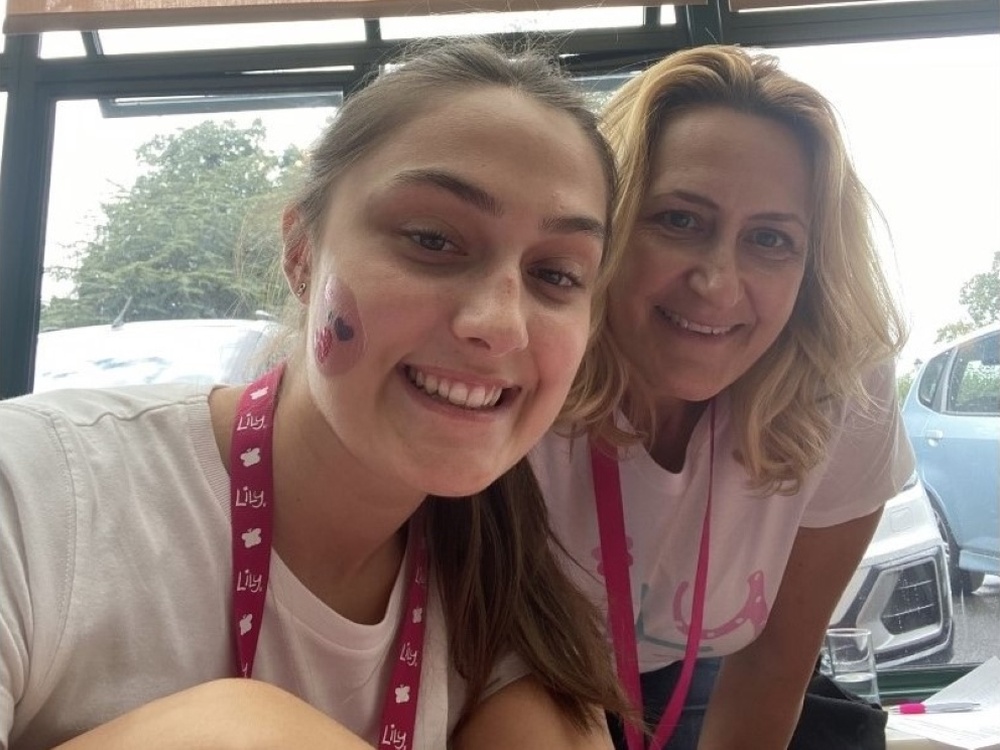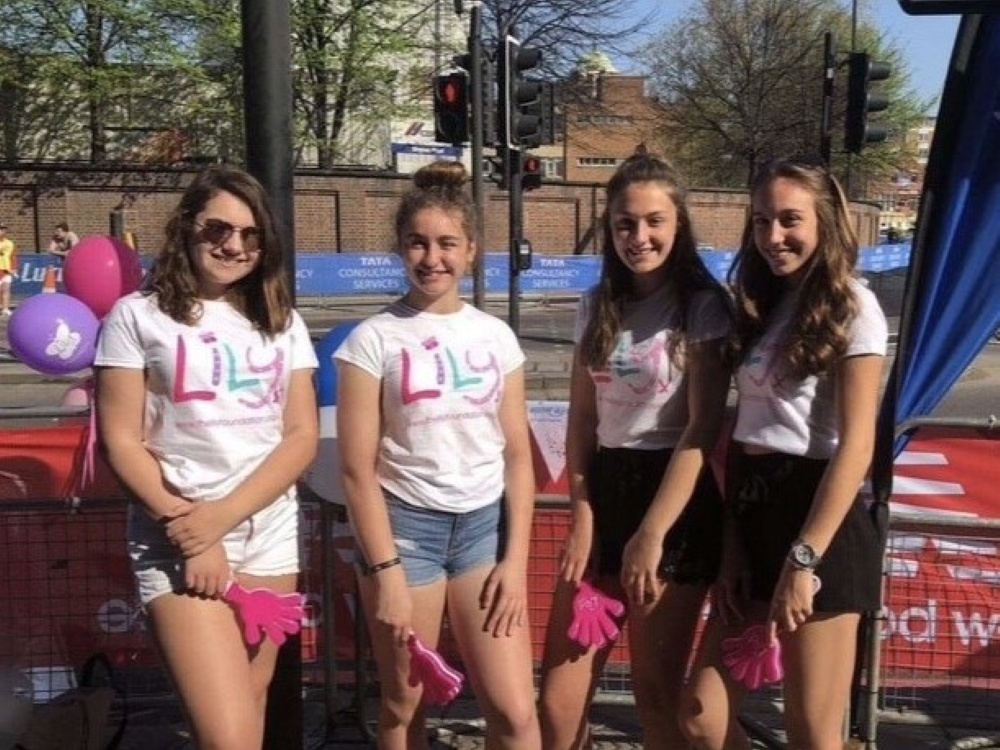How did you first find out about The Lily Foundation, and how did the volunteering come about?
I went to school with Lily’s sister, Katie, and became very good friends with her, so I knew all about the charity, and about mitochondrial disease, from the beginning. It started when Katie and I were doing Duke of Edinburgh. Part of the award is around volunteering, and Katie was going to volunteer to help her mum. After chatting with Liz, I decided to do the same. We started off very low key, making the booklets that get sent out to organisations; we weren’t meeting anyone at that stage. Then I went to the London Marathon as part of the cheer squad and really enjoyed it. After that, every time they had an event I asked to be involved. I think I’ve done most of them now!
Why do you volunteer? How does it make you feel?
I find it so rewarding meeting these people. They’re going through such a horrible time yet they’re the loveliest people I’ve ever met. I love hearing about their lives, and they’re always happy to talk. And if I can ever help them or give them something back that’s so rewarding for me.
I helped at the Lily Family Support Weekend last year as a team leader looking after the 11- to 16-year-olds. It was hectic but great, seeing the kids and their siblings, watching them having fun and properly being kids – especially because they can’t always be the kids they should be. And giving the parents a break so they could relax for a bit too. I enjoyed learning more about mitochondrial disease and the amazing and incredible people who are living with it.
And what about the people you help, what do you think they get out of it?
A lot of the Lily events are about bringing together people affected by mitochondrial disease, so I guess they get a bit of normality, because their lives might otherwise be very different. Connecting people who could potentially be quite lonely and isolated is important. It’s something for them to look forward to, the opportunity to meet people in the same position and also a chance to talk to the experts. And then there’s the fundraising side which is great, of course, because it brings the money in.
On a personal note, hopefully I can help make people feel less alone, make them realise they have other people around them. I imagine it might be easy to get quite caught up in everything, so knowing there are people around you, whether they’re in the same position or are just there to listen or talk, is important. That support is there if they want it, and that’s something I can offer.
Do you think volunteering has helped you in other areas of your life? If so, how?
Definitely. It’s made me more open minded. I take a lot less for granted now as well. It’s massively humbling, especially the Lily weekend – I’ve realised how lucky I am compared to some, and it’s made me humbler in other aspects of my life too. There’s always someone with bigger problems than you. Being reminded of that stops me from getting too caught up in my own issues. Even just meeting people from different backgrounds, that’s opened my mind to how others live as well.
When I started volunteering I was quite anxious. It’s daunting and I’m still quite young, I don’t have as much experience as other people, and I was conscious I was going to be in charge of people’s children which made me a bit nervous. But soon I realised they’re all normal people and I just have to be myself. I went round to all the families of the kids I was looking after and chatted to them, and they were all lovely so that gave me more confidence. It made me feel like I could go and chat to them and always find some common ground; it’s taken away the fear of coming across as naïve.
Are there any valuable new skills and experiences you’ve gained through volunteering?
Better communication skills and more confidence when I’m talking to people, for a start. Then there are the organisational skills – at the Family Weekend I was in charge of other volunteers too, so I had to use my initiative and allocate people where I could best use them. I was responsible for quite a few kids – in fact my group kept getting bigger as some of the older kids got moved up from the younger group! All the activities were supposed to be outdoors but it was chucking it down so we had to think quickly about what we could do inside that included everyone. 11-16 is a big age group, but we came up with some indoor games that everyone could get involved in. The kids had fun, and so did I, in fact I think me having fun with them made it nicer for them as well.
Do you think it’s given you a better chance when it comes to future job opportunities?
Whenever possible I apply the skills I’ve learnt with The Lily Foundation to other things. I volunteer for Alzheimer’s Society now through university. I had to be interviewed and they definitely liked the fact I already had some volunteering experience. It’s included in my personal statement for uni too. It’s such a good skill, I think it makes me stand out. It’s not just a box-ticking exercise either, I genuinely enjoy the events. That reflects in other aspects of any volunteer’s life too – I think it shows you’re more willing to go above and beyond and do something selfless.
And will you continue with the volunteering in the future? Do you think you’ll always be able to make time?
Absolutely. I enjoy it, and now I know Lily’s family, I’ve got that direct contact with Liz and I’ve got to know the rest of the team, I hope I’m someone they’d want to call upon! I know it benefits me, but it benefits the families too, so I’d always want to make time for it. I always feel a little bit better about myself afterwards. It helps put life in perspective which I think is very important.
Do you have any advice for someone who might be considering volunteering?
I personally think everyone should volunteer in some way because, for a start, volunteers are always needed, but from personal experience the gains you get that you might not even realise you’re getting are so important and so beneficial. It’s not just great for the charity in question but for yourself too.
My advice is to just do it. Most of the time it’s really fun, you get to meet so many amazing people and it’s something you’re never going to regret doing. It’s always going to be good whether it benefits you or those you’re helping – I suppose that’s why I’m keen to spread the word. Even if there isn’t a charity close to your heart, just go for it. I didn’t even know what mitochondrial disease was before I knew about The Lily Foundation and now that I do, I can spread awareness. Of course, the focus should be on the families, but I always leave thinking “I got a lot out of that as well”.
Visit Volunteers’ Week for further information and advice about getting involved with a charity.



